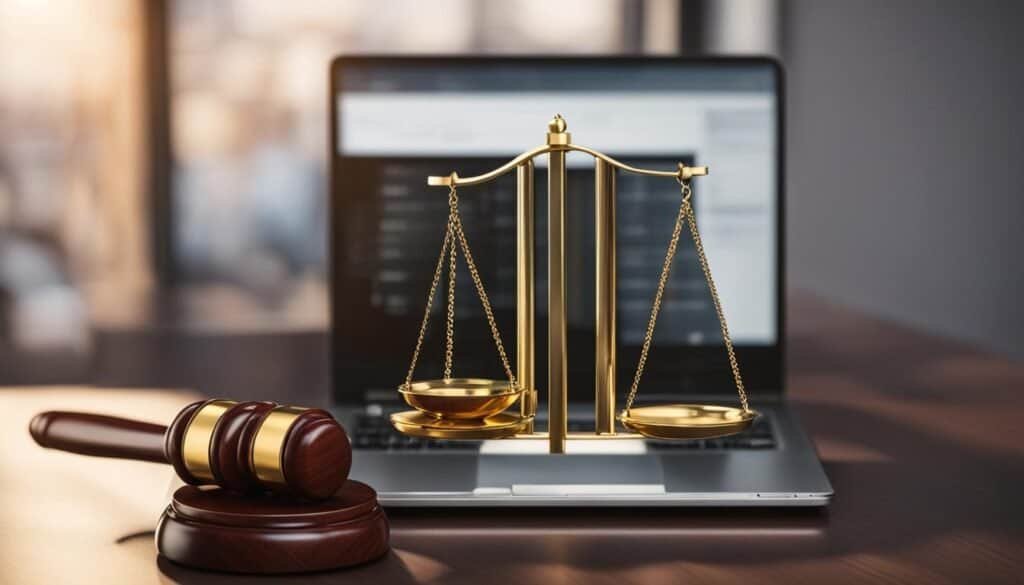When it comes to hacking, the question of legality is a complex issue. One common question that comes up is whether hacking a hacker is illegal? In this article, we will explore the different laws and regulations surrounding hacking and cybercrime to provide a clear understanding of the legal implications involved.
Before delving into the legality of hacking a hacker, it’s important to understand the laws and regulations surrounding hacking and cybercrime. Hacking laws vary by country, and it’s crucial to understand the specific laws in your jurisdiction to avoid breaking the law. Cybercrime regulations are in place to prevent unauthorized access to computer systems and protect sensitive information.
In the United States, the Computer Fraud and Abuse Act (CFAA) is the primary federal law that addresses hacking and cybercrime. The act prohibits access to computers and computer systems without authorization, and those who engage in illegal hacking activities can face significant fines and imprisonment.
Understanding the legal boundaries of hacking and cybercrime is crucial for individuals to stay safe and avoid facing legal consequences, such as fines or imprisonment.
Key Takeaways:
- Hacking laws and regulations are in place to combat cybercrime and prevent unauthorized access to computer systems.
- The Computer Fraud and Abuse Act (CFAA) is the primary federal law in the United States that addresses hacking and cybercrime.
- Individuals must understand the legal boundaries of hacking to avoid facing legal consequences.
Understanding Hacking Laws and Regulations
Hacking is a serious offense that can lead to significant legal consequences. Governments around the world have enacted laws and regulations to combat cybercrime and protect individuals and organizations from illegal hacking activities.
The United States, in particular, has established various federal and state laws to address hacking. The Computer Fraud and Abuse Act (CFAA) is a federal law that criminalizes a wide range of hacking activities, including unauthorized access to computer systems and theft of sensitive information. Violators of the CFAA may face fines and imprisonment.
Additionally, many states have their own laws that address hacking and cybercrime. For example, California’s Comprehensive Computer Data Access and Fraud Act makes it illegal to hack into computer systems to steal or alter information.
The Role of Cybercrime Regulations
In addition to laws, governments have also established regulations to combat cybercrime. Cybercrime regulations are designed to provide guidelines and best practices for individuals and organizations to protect themselves from hacking and other types of cybercrime.
The International Organization for Standardization (ISO) has developed a set of standards for information security management, known as ISO/IEC 27001. These standards provide a framework for organizations to establish and maintain an effective information security management system.
The National Institute of Standards and Technology (NIST) has also developed guidelines for cybersecurity, including the Cybersecurity Framework. The framework provides a voluntary set of standards and best practices for organizations to manage and reduce cybersecurity risks.
Keeping Up with Hacking Laws and Regulations
As technology continues to advance, governments and regulatory bodies will continue to update laws and regulations to address emerging cyber threats. It is essential for individuals and organizations to stay informed about these changes and ensure they are compliant with all relevant laws and regulations.
Regularly reviewing and updating cybersecurity policies and procedures is crucial for protecting against hacking and other types of cybercrime. By staying informed about hacking laws and regulations, individuals and organizations can take proactive measures to prevent cyber attacks and minimize the legal risks associated with hacking activities.
– Ginni Rometty, CEO of IBM
Exploring the Legal Consequences of Hacking
Engaging in hacking activities can have severe legal consequences. The penalties and charges associated with illegal hacking actions can vary depending on the severity of the offense and the laws of the jurisdiction in which the crime was committed.
Hackers who are caught and convicted of illegal activities may face imprisonment, fines, and even civil lawsuits. In some cases, they may also be required to pay restitution to the victims of their crimes.
The legal consequences of hacking can have a significant impact on an individual’s life and future. A criminal record can make it difficult to find employment, obtain loans or credit, and even travel internationally.
| Illegal Hacking Activity | Legal Consequences |
|---|---|
| Unauthorized Access to a Computer System | Imprisonment, fines, civil lawsuits |
| Theft of Personal Information | Imprisonment, fines, civil lawsuits, identity theft charges |
| Disruption of Service | Imprisonment, fines, civil lawsuits, potential terrorist or cyber-terrorism charges |
To avoid facing legal consequences for hacking activities, it is essential to understand the boundaries of the law and to ensure that all online actions are within legal limits. Seeking legal advice can also help individuals protect themselves from accidentally crossing the line into illegal activities.
It is crucial to emphasize that illegal hacking activities not only have legal consequences but can also cause significant harm to individuals, organizations, and even society as a whole. The damage caused by cybercrime can be extensive and long-lasting, making it essential for all individuals and organizations to prioritize cybersecurity and follow best practices for online safety.
Ethical Considerations and Hacking Legality
When it comes to hacking, the ethical considerations are just as crucial as the legal implications. Hacking involves accessing systems and data without permission, which raises concerns about privacy and security.
Some hackers believe that their actions are justified to expose vulnerabilities in systems and bring attention to security flaws. However, others argue that hacking is never ethical and that it always violates the rights of the system owner.
Despite the ongoing debate, it is essential to remember that hacking is not a victimless crime. Whether it is an individual or an organization, the target of the hacking is impacted, and their privacy is breached.
“Hacking may seem harmless to some, but it is a serious breach of privacy and an infringement on the rights of others.”
In addition to the legal consequences of hacking, the ethical considerations can damage a hacker’s reputation and credibility within the hacking community. There is a growing movement towards ethical hacking, where individuals use their skills for positive purposes, such as identifying and fixing vulnerabilities in systems.
It is important to remember that ethical hacking requires permission from the system owner and adherence to ethical guidelines. As with any field, there are ethical standards and codes of conduct that professionals must follow.
Ultimately, the ethical considerations of hacking are complex and situational. However, it is essential to prioritize privacy, security, and respect for the rights of others.
Understanding the Legal Implications of Hacking

When it comes to hacking, the legal implications can be severe. From fines to imprisonment, the consequences of illegal hacking activities can be life-changing. It is important for individuals and organizations to understand the potential legal consequences of hacking to avoid falling afoul of the law.
Under existing hacker laws and regulations, it is illegal to access computer systems and networks without authorization. This includes hacking into someone’s social media account, stealing credit card information, or attempting to shut down a website. Penalties for these offenses can range from fines to long-term imprisonment.
| Penalties for Illegal Hacking | |
|---|---|
| Up to $100,000 in fines | – Hacking into a government computer |
| Up to 20 years in prison | – Stealing classified information |
| Up to 10 years in prison | – Causing damage to a computer system |
| Up to 5 years in prison | – Illegally accessing a computer system |
As we can see from the table, the penalties for hacking-related offenses can be severe, highlighting the importance of understanding the legal boundaries of hacking.
Additionally, the legal implications of hacking go beyond just the individual committing the offense. Organizations can face significant financial and reputational damage if they fall victim to a cyber attack. They may also be held liable for any damages caused as a result of a breach, further emphasizing the importance of cybersecurity measures.
Overall, it is crucial for individuals and organizations alike to understand the legal implications of hacking. By prioritizing cybersecurity and staying informed about hacker laws and regulations, it is possible to stay safe in the digital world and avoid any legal repercussions.
Examining Hacker Activities and Legality
When we talk about hacker activities, we are referring to a wide range of practices and techniques that can be used to gain unauthorized access to computer systems and networks. While some of these activities may be legal under certain circumstances, many can be considered illegal under existing laws and regulations.
One of the most common hacker activities is known as “penetration testing,” which is a technique used to identify vulnerabilities in computer systems and networks. Penetration testing can be a legal and valid tool for security professionals to assess the strength of security measures, but it can also be used for nefarious purposes.
It is essential to note that just because someone refers to themselves as a hacker, it does not necessarily mean they are engaging in illegal activities. Ethical hackers, also known as “white hat” hackers, use their skills to help organizations identify and fix vulnerabilities in their systems, with the goal of improving overall security.
Other hacker activities that can be considered illegal include:
- Spreading malware or viruses;
- Stealing sensitive information, such as financial data or personal information;
- Engaging in phishing or other forms of social engineering;
- Using someone else’s computer or network without authorization;
- Committing identity theft or fraud;
- Breaking into secure systems or networks.
It is crucial to understand that these activities can lead to severe legal consequences. In the United States, for example, the Computer Fraud and Abuse Act (CFAA) is the primary federal law governing computer crimes and hacking activities. The law covers various activities, including accessing a computer without authorization, stealing information, and transmitting harmful code.
| Legal Consequences of Hacking Activities | Penalties |
|---|---|
| Accessing a computer without authorization | Up to 5 years in prison and/or a fine |
| Causing damage or loss to a protected computer | Up to 10 years in prison and/or a fine |
| Using a computer to commit fraud or obtain anything of value | Up to 10 years in prison and/or a fine |
| Intentionally trafficking in passwords or other similar information | Up to 10 years in prison and/or a fine |
As you can see, the legal consequences of engaging in illegal hacking activities can be severe. Individuals may face significant fines and extended periods of imprisonment, depending on the severity of the offense.
Furthermore, in addition to criminal charges, individuals who engage in illegal hacking activities may also face civil lawsuits from individuals or organizations impacted by their actions. For example, a company whose server was breached may sue the hacker for damages.
It is essential to be aware of the legal implications of hacking activities and to understand the risks involved. While the act of hacking itself may seem exciting and rewarding, the potential consequences are not worth the short-term gains. It is always best to stay on the right side of the law and engage in ethical hacking practices that contribute to improving cybersecurity.
Navigating the Gray Areas of Hacking

While some hacking activities are clearly illegal, others fall into a gray area where it can be difficult to determine the legality of certain actions. One example is ethical hacking, where a hacker is employed by an organization to identify weaknesses in their system and improve cybersecurity. This practice is legal and beneficial, but it can be challenging to differentiate between ethical hacking and illegal hacking.
“The difference between a hacker and a criminal is intent,” says computer security consultant, Kevin Mitnick.
Another gray area is the use of hacking techniques to expose wrongdoing or government surveillance. While such activities may be illegal, they can be justified as whistleblowing or activism. This tension between the law and individual rights raises complex ethical considerations and debates within the hacking community.
The Case of Edward Snowden
A prime example of this debate is the case of Edward Snowden, who leaked classified information from the National Security Agency (NSA) in 2013. While some consider him a hero for exposing government surveillance practices, others see him as a traitor who compromised national security. Snowden asserts that his actions were in the public interest, but he faces espionage charges for his breach of confidentiality.
| Pros | Cons |
|---|---|
| Snowden’s actions exposed unconstitutional government surveillance | Snowden’s leak threatened national security and endangered lives |
| His whistleblowing sparked a public debate about privacy rights | He violated the trust and confidentiality of his employer and the government |
| Snowden brought attention to the need for reform in government surveillance practices | His actions damaged US foreign relations and diplomacy |
This case demonstrates the complexity of the relationship between hacking, ethics, and legality. While Snowden’s actions may have been illegal, they also exposed government wrongdoing and sparked a public debate on privacy rights.
Ultimately, navigating the gray areas of hacking requires a nuanced understanding of the law, ethics, and individual rights. It is essential to weigh the potential consequences and consider the greater societal impact of one’s actions.
Staying Informed and Safe in the Digital World
With the increasing prevalence of cyber threats, it is more important than ever to prioritize cybersecurity and stay informed about hacking laws and cybercrime regulations. Here are some practical tips and advice to help you stay safe:
- Regularly update your software and operating system to ensure they are secure and up-to-date with the latest security patches.
- Use strong and unique passwords for all your accounts and enable two-factor authentication whenever possible.
- Avoid clicking on suspicious links or downloading attachments from unknown sources.
- Use a reputable antivirus software to protect your devices from malware.
- Be cautious when using public Wi-Fi networks and avoid accessing sensitive information or making transactions on these networks.
- Stay informed about the latest hacking laws and regulations to ensure you understand the legal boundaries of hacking activities.
By following these best practices and remaining vigilant, you can minimize the risks of becoming a victim of hacking or cybercrime.
Remember that cybersecurity is everyone’s responsibility, and staying informed and prepared is vital to protecting yourself and your organization from the evolving threat of cybercrime.
Stay informed and stay safe with these tips on cybersecurity and the latest hacking laws and cybercrime regulations.
Conclusion
After exploring the topic of whether hacking a hacker is illegal, it is clear that the legal boundaries of hacking are complex. While some hacking activities are considered legal, others can result in severe consequences, including fines and imprisonment.
It is crucial for individuals to understand the legal implications of hacking and prioritize cybersecurity by taking steps to protect their personal and professional data. Organizations, in particular, must ensure that they have robust security measures in place to prevent data breaches and cyber attacks.
While the debate over the ethics of hacking continues, it is essential to recognize that illegal hacking activities can have a significant impact on individuals, organizations, and society as a whole. By staying informed about hacking laws and regulations, we can work together to combat cybercrime and protect ourselves in the digital world.
Stay Safe Online
To stay safe online, it is essential to follow best practices for cybersecurity:
- Use strong passwords and enable two-factor authentication on all accounts.
- Keep software and operating systems up to date with the latest security patches.
- Be cautious when clicking on links or downloading attachments from unknown sources.
- Use a reputable antivirus program and firewall.
- Encrypt sensitive data and use secure communication channels.
By following these guidelines and staying informed about hacking laws and cybercrime regulations, we can minimize the risks of illegal hacking activities and protect ourselves and our data.
Is Hacking a Hacker Illegal?
In conclusion, while the answer may not be straightforward, it is essential to recognize that hacking a hacker can be illegal. It is crucial for individuals to understand the legal boundaries of hacking and prioritize cybersecurity to stay safe in the digital world.
Let’s work together to combat cybercrime and protect ourselves and our data from illegal hacking activities.
FAQ
Is hacking a hacker illegal?
Hacking a hacker can be illegal, as it involves engaging in unauthorized access to computer systems, which is a violation of cybercrime laws.
What are hacking laws and regulations?
Hacking laws and regulations are legal frameworks established to address cybercrime. They outline the rights, responsibilities, and consequences related to hacking activities.
What are the legal consequences of hacking?
The legal consequences of hacking can include criminal charges, fines, imprisonment, and damage to one’s reputation. Penalties vary depending on the severity of the offense and jurisdiction.
Are there ethical considerations regarding hacking?
Yes, there are ethical considerations surrounding hacking. While some people argue for the ethical use of hacking techniques for security purposes, engaging in illegal hacking actions is generally considered unethical.
What are the legal implications of hacking?
Hacking can have significant legal implications, including financial loss, data breaches, privacy violations, and damage to individuals or organizations. Laws and regulations aim to protect against these consequences and hold hackers accountable.
Are all hacker activities illegal?
Not all hacker activities are illegal. Ethical hacking, also known as white hat hacking, involves authorized penetration testing and security research. However, engaging in unauthorized hacking actions is illegal.
What are the challenges in determining the legality of hacking actions?
The rapidly evolving nature of hacking makes it challenging to determine the legality of certain actions. The law often struggles to keep up with emerging techniques, creating gray areas where legality may be difficult to determine.
How can I stay safe from illegal hacking activities?
Staying informed about hacking laws and cybercrime regulations is essential. Additionally, implementing robust cybersecurity measures, such as strong passwords, regular software updates, and employee training, can help protect against illegal hacking activities.




0 Comments